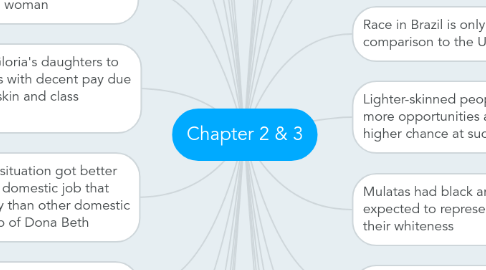Chapter 2 & 3
by Amyeric Gooden

1. Beth's daughter & Gloria both want independence
2. Afro-Brazilian women are treated unequally
3. Afro-Brazilian women get the lowest pay in the country
4. Wealthy children attended first-class institutions whereas, poorer children had to attend second-class institutions that didn't give them the same opportunities as wealthy kids
5. Due to the drastic difference in skin complexion, Eliana's grandson's appearance suggests a radicalized class relationship
6. Brazilians don't feel comfortable speaking about race or racism
7. It was more about class than race in Brazil
8. Race in Brazil is only different in comparison to the U.S.
9. Lighter-skinned people have more opportunities and a higher chance at success
10. Men are more attractive when they're well financially
11. Women are more attractive when they're beautiful and have sex appeal
12. Coroa's money is more about having a better life not necessarily escaping poverty
13. Mulatas had black ancestry but was expected to represent a mixture of their whiteness
14. Internet search of Brazil + Mulata resulted in porn sites
15. Black is said to only be beautiful when white is added in
16. Gloria used jokes as disapproval of Roberto's sexual choice of being with a darker skinned woman
17. It's harder for Gloria's daughters to find quality jobs with decent pay due to their darker skin and class characteristics
18. Gloria's financial situation got better after accepting a domestic job that paid more money than other domestic jobs with the help of Dona Beth
19. Gloria's most colorful period of her life was when she worked for "fags and dykes"
20. Gloria's clients were flexible and helped her when she was in need
21. Gloria made her way into the working class in her late 40's
22. Domestic work takes a lot of time and effort but it hardly keeps everyone clothed and properly fed
23. When Gloria was younger, she couldn't eat the same food that she served to her employer
24. Domestic work was normally associated with dark skin which was associated with slavery, dirty, ugly, & low class
25. Domestic workers had to provide sexual and nurturing services to their employers family
26. Nilda made it out of the low class through marriage
27. Privilege can be inherent or acquired
28. Domestic workers are usually loved and appreciated by their middle and upper class employers
29. Slavery was thought to be in the interest of slaves because it gave them access to certain resources


